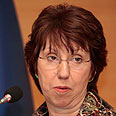
Catherine Ashton
צילום: רויטרס
Official: Iran 'tested' powers at talks
Western sources say failed nuke talks were due to Iran's 'unacceptable' preconditions. 'Iranians are tough negotiators, their aim was to test for splits among the six nations, see if they could extract concessions,' says US source
Another round of talks between Iran and six world powers ended in failure Saturday, with the West hoping the threat of additional sanctions will soon take its toll on the Islamic Republic's nuclear program.
A US official told the Washington Post that the talks in Istanbul had been "long and difficult", and that there was no clear path to proceed.
"The Iranians are tough negotiators, and their aim was to test for splits (among the six nations) and to see if they could extract concessions on their preconditions. They left with a pretty clear impression of the unity of this group," he was quoted anonymously by the Post as saying.
CNN cited a Western source as saying that the EU's foreign policy chief, Catherine Ashton, had taken up a tough position in opposition to Iran.
Iran came to the Istanbul talks with six world powers Friday declaring it would not even consider freezing uranium enrichment – and left the negotiations Saturday repeating the same mantra.
Throughout two days of hectic meetings, it stubbornly pushed demands it must have known were unacceptable to the six – a lifting of sanctions and acceptance of its enrichment program before any further discussion of its nuclear activities.
"Both these preconditions are not the way to proceed," Ashton declared – and added no new talks were planned. She called Iran's final stance "disappointing".
French Foreign Minister Michele Alliot-Marie, visiting Jordan, said Iran had posed preconditions that were "entirely unacceptable".
"They asked for the removal of sanctions and respect for their right to enrich uranium. This brings everything to a halt because the IAEA is unable – due to the lack of cooperation by Iran – to make sure that its nuclear program has peaceful aims," she said.
Israeli officials now talk of a three-year window – until 2014 – before Iran can make a bomb. That compares with projections of 2011 just three years ago.
- Follow Ynetnews on Facebook










